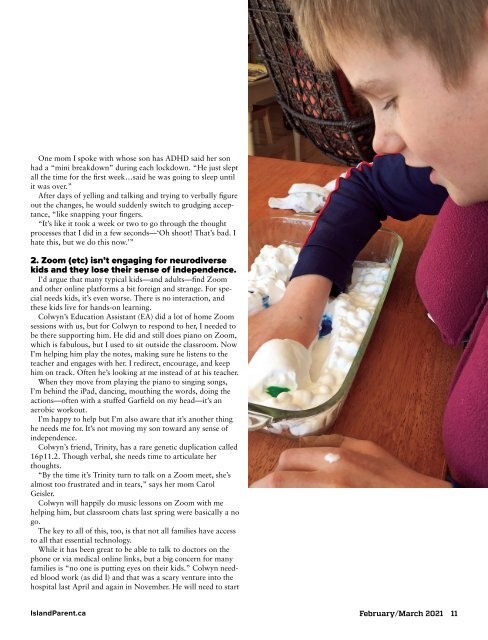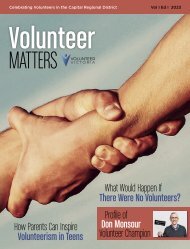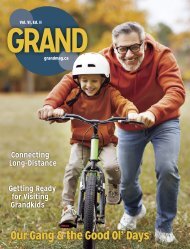Island Parent February/March 2021
Victoria and Vancouver Island's Parenting Resource for 33 Years • Special Needs Issue • 20 Things Parent of Kids with Special Needs Should Hear • From Stylist to Fashion Police: What to do when kids decide what to wear • Kid-friendly Favourites in Tofino
Victoria and Vancouver Island's Parenting Resource for 33 Years • Special Needs Issue • 20 Things Parent of Kids with Special Needs Should Hear • From Stylist to Fashion Police: What to do when kids decide what to wear • Kid-friendly Favourites in Tofino
You also want an ePaper? Increase the reach of your titles
YUMPU automatically turns print PDFs into web optimized ePapers that Google loves.
One mom I spoke with whose son has ADHD said her son<br />
had a “mini breakdown” during each lockdown. “He just slept<br />
all the time for the first week…said he was going to sleep until<br />
it was over.”<br />
After days of yelling and talking and trying to verbally figure<br />
out the changes, he would suddenly switch to grudging acceptance,<br />
“like snapping your fingers.<br />
“It’s like it took a week or two to go through the thought<br />
processes that I did in a few seconds—‘Oh shoot! That’s bad. I<br />
hate this, but we do this now.’”<br />
2. Zoom (etc) isn’t engaging for neurodiverse<br />
kids and they lose their sense of independence.<br />
I’d argue that many typical kids—and adults—find Zoom<br />
and other online platforms a bit foreign and strange. For special<br />
needs kids, it’s even worse. There is no interaction, and<br />
these kids live for hands-on learning.<br />
Colwyn’s Education Assistant (EA) did a lot of home Zoom<br />
sessions with us, but for Colwyn to respond to her, I needed to<br />
be there supporting him. He did and still does piano on Zoom,<br />
which is fabulous, but I used to sit outside the classroom. Now<br />
I’m helping him play the notes, making sure he listens to the<br />
teacher and engages with her. I redirect, encourage, and keep<br />
him on track. Often he’s looking at me instead of at his teacher.<br />
When they move from playing the piano to singing songs,<br />
I’m behind the iPad, dancing, mouthing the words, doing the<br />
actions—often with a stuffed Garfield on my head—it’s an<br />
aerobic workout.<br />
I’m happy to help but I’m also aware that it’s another thing<br />
he needs me for. It’s not moving my son toward any sense of<br />
independence.<br />
Colwyn’s friend, Trinity, has a rare genetic duplication called<br />
16p11.2. Though verbal, she needs time to articulate her<br />
thoughts.<br />
“By the time it’s Trinity turn to talk on a Zoom meet, she’s<br />
almost too frustrated and in tears,” says her mom Carol<br />
Geisler.<br />
Colwyn will happily do music lessons on Zoom with me<br />
helping him, but classroom chats last spring were basically a no<br />
go.<br />
The key to all of this, too, is that not all families have access<br />
to all that essential technology.<br />
While it has been great to be able to talk to doctors on the<br />
phone or via medical online links, but a big concern for many<br />
families is “no one is putting eyes on their kids.” Colwyn needed<br />
blood work (as did I) and that was a scary venture into the<br />
hospital last April and again in November. He will need to start<br />
<strong>Island</strong><strong>Parent</strong>.ca<br />
<strong>February</strong>/<strong>March</strong> <strong>2021</strong> 11

















